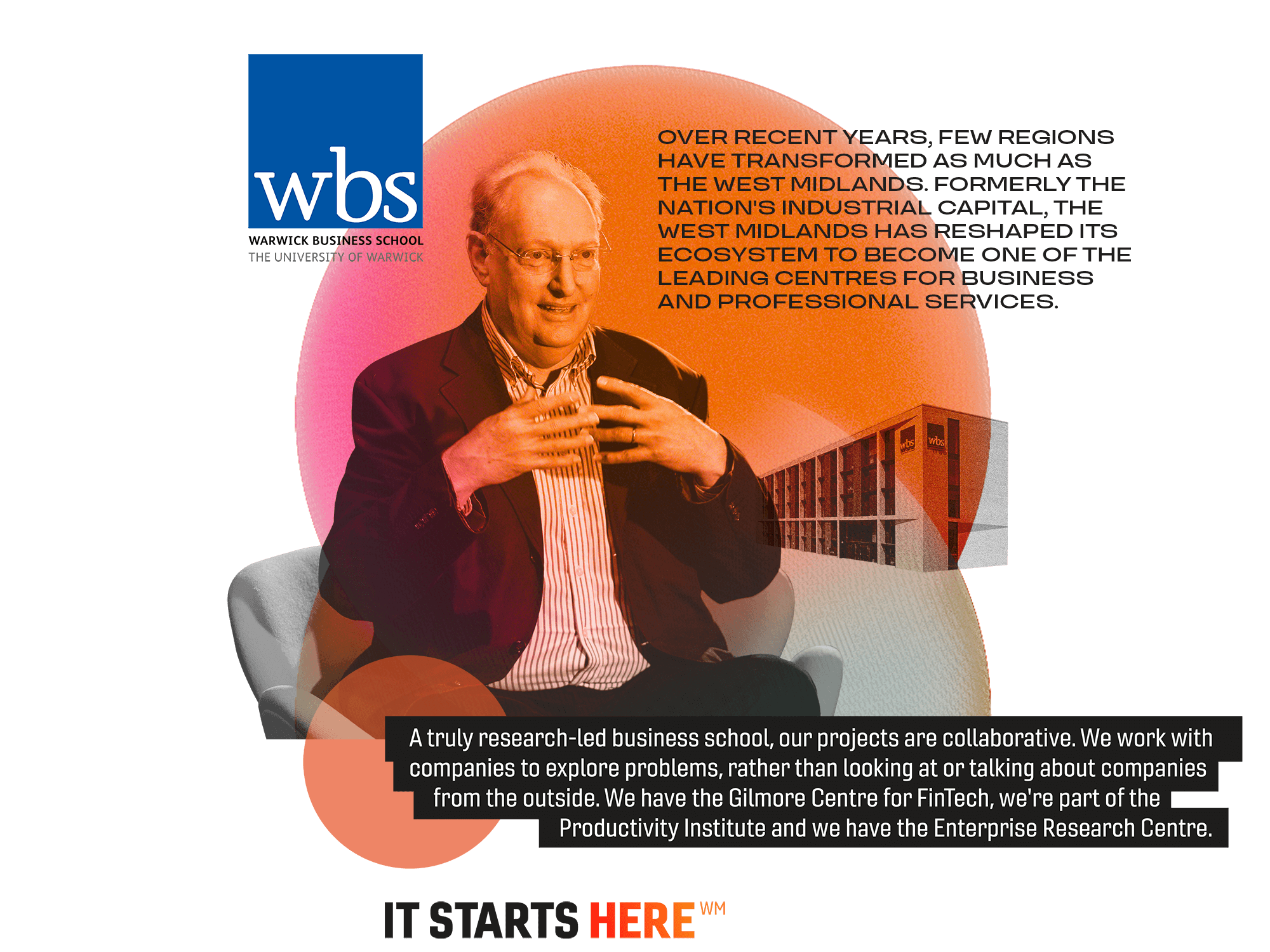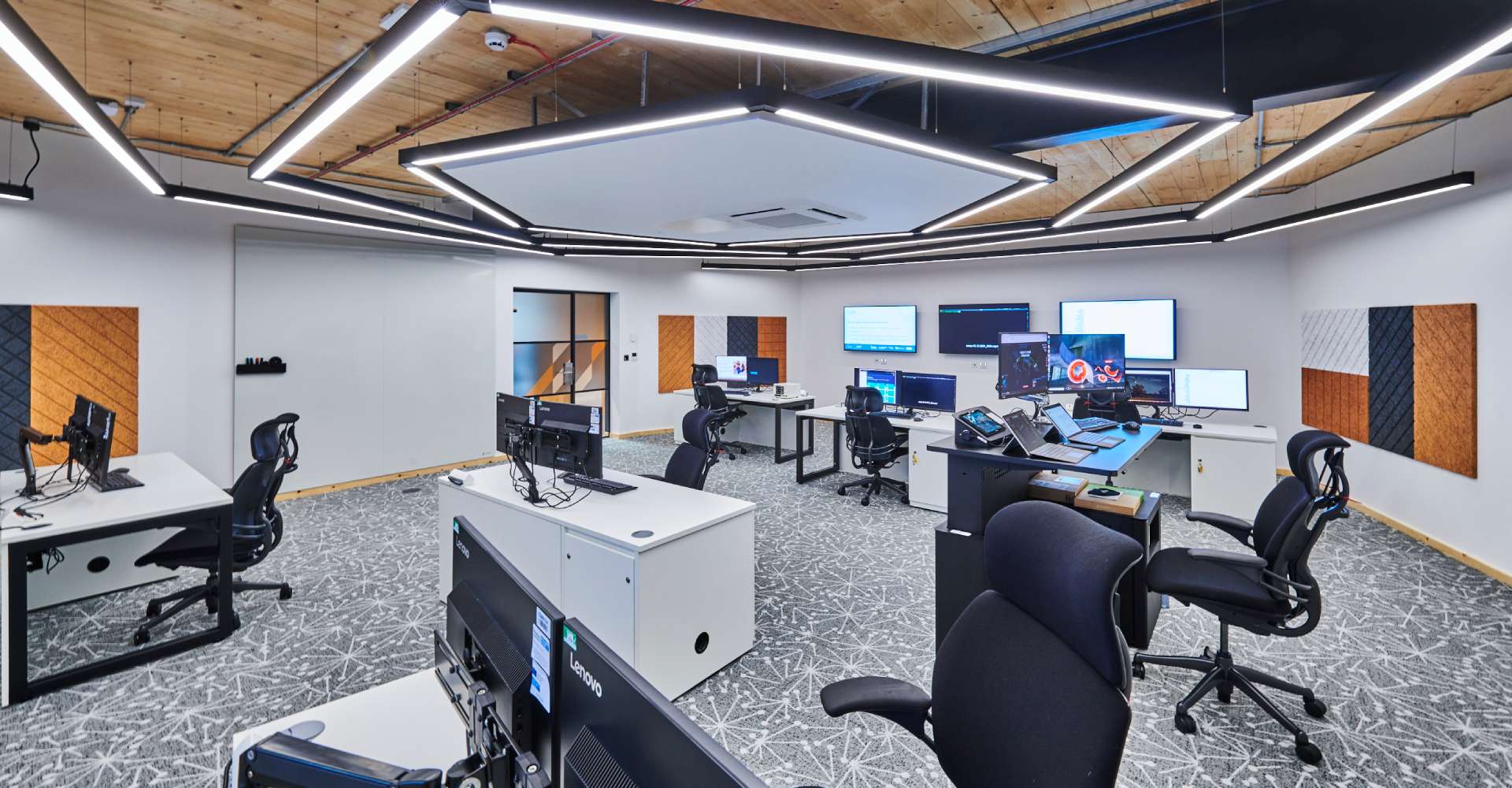Driving Business Talent from Classroom to Boardroom
Warwick Business School Case Study

How Warwick Business School is helping shape the West Midlands business landscape
Over recent years, few regions have transformed as much as the West Midlands. Formerly the nation’s industrial capital, the West Midlands has reshaped its ecosystem to become one of the leading centres for business and professional services. The regional sector is currently worth £28bn, and is anticipated to hit £50bn by 2030. This transformation has led high-profile businesses like HSBC and Goldman Sachs to relocate their headquarters to the area.
Nigel Driffield, a professor at Warwick Business School and Deputy Pro Vice Chancellor for Regional Engagement at the University of Warwick, recognises the critical role universities have to play in the broader ecosystem. He says:
‘My interest is around the interaction between firms and the places that they’re in. Perhaps one way of putting this is if you think of a place, and you want to improve the performance of the firms in that place, you really only have three options. You either grow firms from scratch which are better than the ones you already have, you make the established companies better, or you attract new firms into the area. Our engagement with the business ecosystem and with students is about those three things.’
As a global top-20 business school, Warwick attracts – and produces – some of the nation’s brightest business talent.
‘The young people we work with are destined to have much more dynamic careers than in the past. Our graduates are as likely to start their own businesses as they are to go into a more traditional role with a big employer. They still need highly specialised skills from us, but they also need general operational and softer management skills, to perform all the roles required of a business founder. This enhanced entrepreneurial drive means that firms within our region have to work hard to develop their value proposition, and that’s an area where we can help.’
In the last UK Government Research Excellence Framework Warwick Business School attracted income of ££21.5m. Professor Driffield explains:
‘Ours is truly a research-led business school, and our projects are collaborative. We work with companies to explore problems, rather than looking at or talking about companies from the outside. We have the Gilmore Centre for Financial Technology, we’re part of the Productivity Institute, we have the Enterprise Research Centre. All these centres do very practical research with businesses, but I think one of the things which is unique about Warwick Business School is the fact that it’s so embedded within and oriented towards the West Midlands. All our work ties back into our own region – questions around productivity, attracting foreign direct investment (FDI), and so on. The graduates we produce draw some of the world’s biggest businesses to the West Midlands. Those businesses then provide employment , which helps the region retain great talent. In this way, Warwick Business School is helping shape the business and economic landscape, and it’s a role we embrace.’
It would be impossible for any business school to produce relevant talent in isolation, and Professor Driffield recognises the importance of the networks which exist between Warwick Business School and other key players.
‘We can’t be effective without the collaboration of the private sector, or indeed the third sector. We position ourselves at the heart of various networks all considering different questions: how to improve healthcare, how to stimulate small business, how to attract inward investment. By collaborating closely with partner organisations we get a voice that we then use within our business community, and it also gives us a test bed to put our theories into practice. The Productivity Institute is a really good example of this kind of collaboration. We have policy members and private sector members all coming together to discuss how we can collaborate to improve West Midlands productivity.’
With expert academics keen to shape and nurture the business ecosystem, it’s hardly surprising that so many companies choose to make the West Midlands their home. In fact, apart from London, over the last 15 years the region has outperformed the rest of the UK in terms of attracting inward investment. This includes encouraging firms to relocate from other parts of the country, as well as attracting investment from abroad. Professor Driffield is proud to have played an important role in this process.
‘I first started working with the West Midlands Growth Company in about 2010 on a strategy for attracting investment to the region. This has since been nuanced and redeveloped, but the fundamental approach has been recognised as world leading in many respects. It’s all about creating a relevant value proposition to potential investors. At the Business School, one of the things small companies ask us all the time is how we can help them join the supply chain of one of our leading regional multinationals. On the other side, when an inward investor is circling they want to know what the ecosystem is like. How can they develop supply chains within the region? What skills are available? So understanding both sides of that coin and communicating very clearly, this is what we’re excellent at. Putting all that analysis together means we’re able to create a very strong value proposition and that’s why inward investment in the West Midlands has been so strong.’
Professor Driffield has some simple advice for companies considering their location:
‘Consider how well the strengths of a region match your long-term goals. Can the area provide you with the skills you need, the finance you need and the premises that you need? Will there be room for growth? Is there enough talent to stimulate innovation? I think that the West Midlands ticks a lot of boxes for a lot of companies. We have lots of universities providing skills, we have people who can provide finance and we also have investment land. Perhaps this is why our FDI strategy has been so effective.’
DIVE IN TO ANOTHER STORY:

Medherant Sticks to Success
It Starts Here

Riding the Wave of Disruptive Tech
It Starts Here

UKBIC Powers Nation Towards Electrification
It Starts Here



